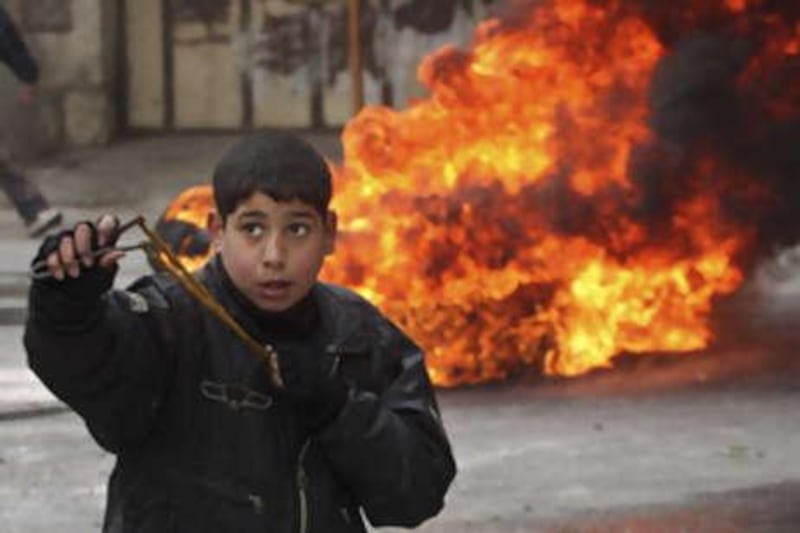RAMALLAH, WEST BANK // Shops were open in Ramallah yesterday, after being closed on Saturday and Sunday in solidarity with the people of Gaza. But things are far from normal in this West Bank town, the administrative centre of the Palestinian Authority. At the Qalandiya checkpoint, where the Israeli army controls access to and from Ramallah, the smell of tear gas hung heavy over the streets at noon. An Israeli soldier behind a concrete barrier fired off the odd round at a lone youngster who had approached the checkpoint near the Israeli separation barrier, here a nine-metre high concrete wall.
One road to the checkpoint was nearly blocked by the wreckage of an old car that had evidently been placed there to prevent Israeli jeeps from entering. Streets were scorched, evidence of recent demonstrations that had erupted as a result of the carnage in Gaza. In Qalandiya, the Palestinian security forces have no presence. In Ramallah, however, where they do, a similar scene had unfolded on one road, nowhere near any Israeli army post.
Here, too, the road had been blocked, this time by burnt-out debris from a nearby building site and a rubbish container that had been stood on its side. But on this road, not far from a Fatah office, the obstacle would seem to have been placed against Palestinian security forces. The Palestinian police and security forces across the West Bank have been deployed in numbers in recent days to contain solidarity demonstrations with Gaza. The security forces, say officials, are there to prevent people from moving towards possible areas of friction with the Israeli army and thus to prevent casualties.
Some, however, bristled at their actions. "Who are they protecting?" asked one Ramallah youngster who declined to be identified. "Are we supposed to sit here while they murder us in Gaza?" The bombardment of Gaza has put the Palestinian Authority and Fatah in a difficult position. Wary of escalation in the West Bank but equally conscious of being seen as in any way condoning the Israeli attacks against Hamas, its bitter domestic rival, officials have been scrambling to find a suitable message in response.
Suggestions by some senior PA officials, including Nimr Hamad, a political adviser to Mahmoud Abbas, the president, that Hamas was culpable by firing rockets and not renewing its six-month ceasefire, did not go down well. "I think [PA officials] have realised that the statements some of them have been making have been very harmful," said Ghassan Khatib, a political analyst. The invitation extended by Mr Abbas to all Palestinian factions, including Hamas, for a meeting to discuss the situation was an attempt to repair some of the damage made by earlier remarks. Judging by Hamas's reaction, however, the damage will take longer to repair. Fawzi Barhoum, a Hamas spokesman, declined Mr Abbas's invitation and said the PA president should first "stop justifying the attack against Gaza and release the political detainees", a reference to Hamas members in the West Bank who have been arrested in recent months by PA security forces. "The problem is that the Palestinian side is divided," said Issa Samander, of the Stop the Wall grassroots movement, which organises demonstrations against Israel's separation barrier in the West Bank. Mr Samander dismissed charges by Hamas spokespeople in Gaza of PA collusion with Israel. But by confronting demonstrators, he said, the security forces are only deepening Palestinian divisions. "People are very angry, angry beyond words at what is happening in Gaza. This anger must be allowed to come out, and better in peaceful demonstrations." Mr Khatib said that the PA had been placed in a lose-lose situation. "The PA is already seen by some as colluding with what is happening in Gaza. No matter what the PA does it will lose. If it allows demonstrations to go ahead full force, it could become an uncontrollable situation. If it clamps down it will lose. If Hamas wins in Gaza, the PA loses; if Israel wins, the PA loses. Unfortunately, there is not a lot the PA can do." But analysts and officials inside the PA say the authority cannot appear to be doing nothing. Yesterday Ahmed Qureia, the Palestinian chief negotiator, announced that negotiations with Israel would be suspended, a small gesture considering no meetings had been scheduled. Mr Qureia himself had announced last month that negotiations had been tabled until the Israeli elections were held. Meanwhile, there is growing discontent among ordinary Palestinians who, according to poll after poll, consider Palestinian unity the top priority for Palestinian factions. okarmi@thenational.ae





